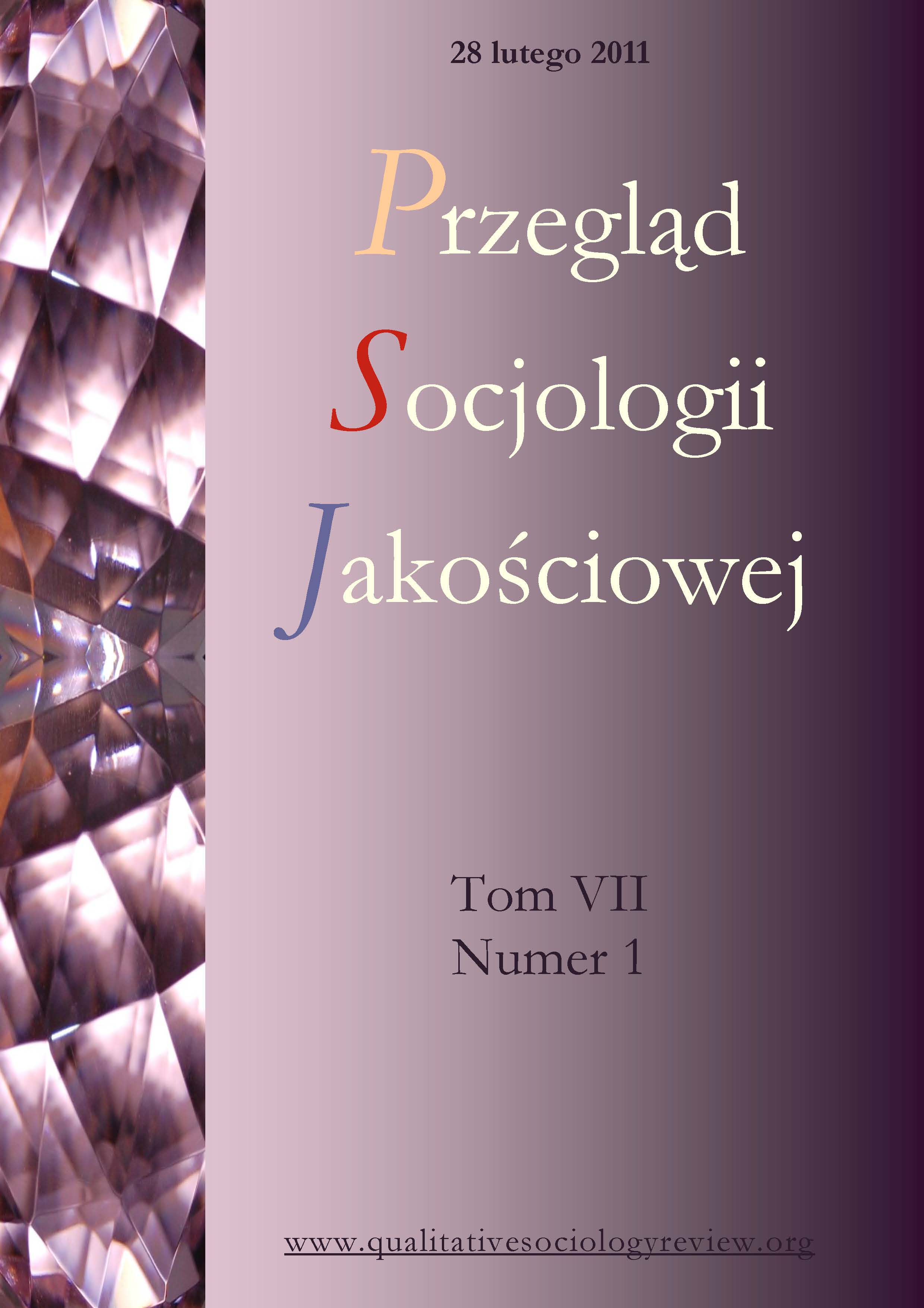Hobbyists-madcaps: deviants, freaks, normals - about a claim for the normality acknowledgement
DOI:
https://doi.org/10.18778/1733-8069.7.1.05Keywords:
Passion, Madcap (Hobbyist), Social distinctness, Labeling, Stigmatization, NormAbstract
The article presents the author’s attempt to define a particular kind of people who realize various types of interests with a strong commitment – the ‘hobbyists’. Primarily open to scrutiny, is how the typical patterns of their careers are being constructed. Moreover, both the significant others’ negative reactions to hobbyists’ activity, and the reasons of why they act in a certain way are elucidated. Hobbyists’ strategies and actions undertaken in order to defend against ‘deviants’ stigmatization’, and their struggle for a status of being ‘normal’ are presented in (ewentualnie the further parts of) this article. The ‘revealed’ (lub reconstructed) strategies are: Professionalization of hobbyist’s passion; ‘Factual’ denial of stereotypical view; Dividing ’normal’ hobbyists from ‘deviant’ ones, Underlining one’s exceptionality (dramatization) in order to gain the acceptance; Using humor and sarcasm; Distancing from the one’s social world.
Downloads
References
Abbott, Andrew (1988) The System of Professions. An Essay on The Division of Expert Labor. Chicago-London: The University of Chicago Press.
Google Scholar
DOI: https://doi.org/10.7208/chicago/9780226189666.001.0001
Becker, Howard i Anselm L. Strauss (1956) “Careers, Personality and Adult Socialization”, The American Journal of Sociology Vol. LXII (3): 254-263
Google Scholar
DOI: https://doi.org/10.1086/222002
Blumer, Herbert (2007) Interakcjonizm symboliczny. Perspektywa i metoda. Kraków: Zakład Wydawniczy Nomos.
Google Scholar
Burrage, Michael i Rolf Torstendahl (1990) Professions in theory and history – rethinking the study of the professions. London-Newbury Park-New Delhi: Sage.
Google Scholar
Festinger, Leon (1957) A Theory of Cognitive Dissonance. Stanford CA: Stanford University Press.
Google Scholar
Glaser, Barney (1978) Theoretical Sensitivity. Advances in the Methodology of Grounded Theory. Mill Valley: The Sociology Press.
Google Scholar
Glaser, Barney i Anselm L. Strauss (1967) Discovery of Grounded Theory. Strategies for Qualitative Research. Chicago: Aldine.
Google Scholar
DOI: https://doi.org/10.1097/00006199-196807000-00014
Goffman, Erving (1961) Asylums: Essays on the Social Situation of Mental Patients and Other Inmates. New York: Doubleday Anchor.
Google Scholar
Goffman, Erving (2005) Piętno. Rozważania o zranionej tożsamości. Przełożyły A. Dzierżyńska i J. Tokarska-Bakir. Gdańsk: Gdańskie Wydawnictwo Psychologiczne..
Google Scholar
Gorzko, Marek (2008) Procedury i emergencja. O metodologii klasycznych odmian teorii ugruntowanej. Szczecin: Wydawnictwo Naukowe Uniwersytetu Szczecińskiego.
Google Scholar
Hughes, Everett C. (1958) Men and Their Work. Glencoe: The Free Press.
Google Scholar
Konecki, Krzysztof T. (2000) Studia z metodologii badań jakościowych. Teoria ugruntowana. Warszawa: Wydawnictwo Naukowe PWN.
Google Scholar
Levis, Helen B. (1971) Shame and Guilt in Neurosis. New York: International University Press.
Google Scholar
Ragin, Charles (2000) Fuzzy-Set Social Science. Chicago: University of Chicago Press.
Google Scholar
Scheff, Thomas J. (1984) Being Mentally Ill. Piscataway: Aldine Transaction.
Google Scholar
Scheff, Thomas J. (1990) Microsociology: Discourse, Emotion, and Social Structure. Chicago: University of Chicago Press.
Google Scholar
Sikorski, Czesław (1995) Profesjonalizm. Filozofia zarządzania nowoczesnym przedsiębiorstwem. Warszawa: PWN.
Google Scholar
Strauss, Anselm L. (1987) Qualitative Analysis for Social Scientists. Cambridge: Cambridge University Press.
Google Scholar
DOI: https://doi.org/10.1017/CBO9780511557842
Strauss, Anselm L. i Juliet M. Corbin (1990) Basics of Qualitative Research. Grounded Theory Procedures and Techniques. Thousand Oaks: Sage.
Google Scholar
Strauss, Anselm L. i Juliet M. Corbin (1998) Basics of Qualitative Research. Techniques and Procedures for Developing Grounded Theory. Thousand Oaks: Sage.
Google Scholar
Vaillant, George E. (1992) Ego Mechanisms of Defense: A Guide for Clinicians and Researchers. Washington: American Psychiatric Press Inc.
Google Scholar
Zadeh, Lotfi (1965) “Fuzzy Sets.” Information and Control, June, No. 8, s. 338-359.
Google Scholar
DOI: https://doi.org/10.1016/S0019-9958(65)90241-X
Downloads
Published
How to Cite
Issue
Section
License

This work is licensed under a Creative Commons Attribution-NonCommercial-NoDerivatives 4.0 International License.














